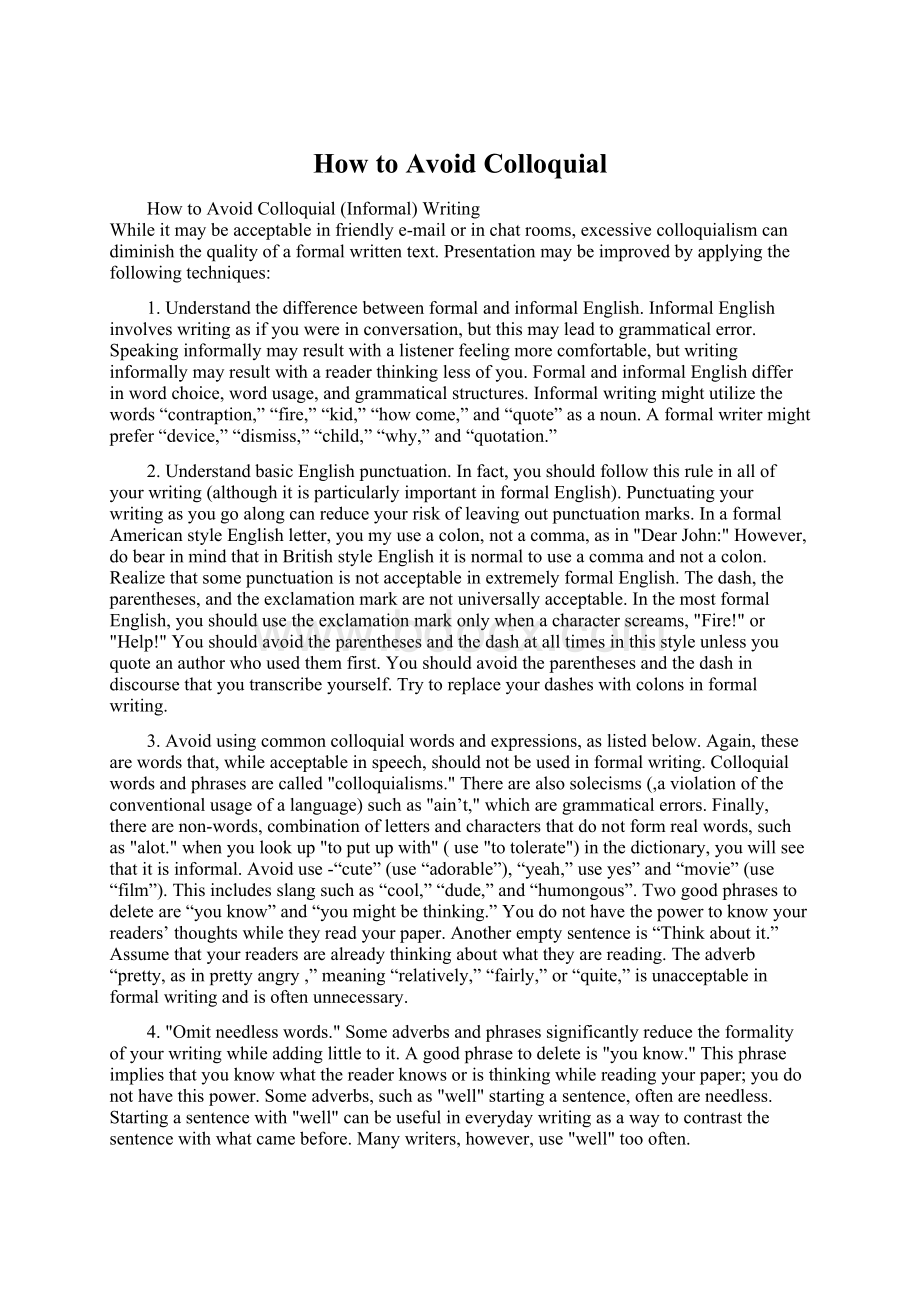How to Avoid Colloquial.docx
《How to Avoid Colloquial.docx》由会员分享,可在线阅读,更多相关《How to Avoid Colloquial.docx(10页珍藏版)》请在冰豆网上搜索。

HowtoAvoidColloquial
HowtoAvoidColloquial(Informal)Writing
Whileitmaybeacceptableinfriendlye-mailorinchatrooms,excessivecolloquialismcandiminishthequalityofaformalwrittentext.Presentationmaybeimprovedbyapplyingthefollowingtechniques:
1.UnderstandthedifferencebetweenformalandinformalEnglish.InformalEnglishinvolveswritingasifyouwereinconversation,butthismayleadtogrammaticalerror.Speakinginformallymayresultwithalistenerfeelingmorecomfortable,butwritinginformallymayresultwithareaderthinkinglessofyou.FormalandinformalEnglishdifferinwordchoice,wordusage,andgrammaticalstructures.Informalwritingmightutilizethewords“contraption,”“fire,”“kid,”“howcome,”and“quote”asanoun.Aformalwritermightprefer“device,”“dismiss,”“child,”“why,”and“quotation.”
2.UnderstandbasicEnglishpunctuation.Infact,youshouldfollowthisruleinallofyourwriting(althoughitisparticularlyimportantinformalEnglish).Punctuatingyourwritingasyougoalongcanreduceyourriskofleavingoutpunctuationmarks.InaformalAmericanstyleEnglishletter,youmyuseacolon,notacomma,asin"DearJohn:
"However,dobearinmindthatinBritishstyleEnglishitisnormaltouseacommaandnotacolon.RealizethatsomepunctuationisnotacceptableinextremelyformalEnglish.Thedash,theparentheses,andtheexclamationmarkarenotuniversallyacceptable.InthemostformalEnglish,youshouldusetheexclamationmarkonlywhenacharacterscreams,"Fire!
"or"Help!
"Youshouldavoidtheparenthesesandthedashatalltimesinthisstyleunlessyouquoteanauthorwhousedthemfirst.Youshouldavoidtheparenthesesandthedashindiscoursethatyoutranscribeyourself.Trytoreplaceyourdasheswithcolonsinformalwriting.
3.Avoidusingcommoncolloquialwordsandexpressions,aslistedbelow.Again,thesearewordsthat,whileacceptableinspeech,shouldnotbeusedinformalwriting.Colloquialwordsandphrasesarecalled"colloquialisms."Therearealsosolecisms(,aviolationoftheconventionalusageofalanguage)suchas"ain’t,"whicharegrammaticalerrors.Finally,therearenon-words,combinationoflettersandcharactersthatdonotformrealwords,suchas"alot."whenyoulookup"toputupwith"(use"totolerate")inthedictionary,youwillseethatitisinformal.Avoiduse-“cute”(use“adorable”),“yeah,”useyes”and“movie”(use“film”).Thisincludesslangsuchas“cool,”“dude,”and“humongous”.Twogoodphrasestodeleteare“youknow”and“youmightbethinking.”Youdonothavethepowertoknowyourreaders’thoughtswhiletheyreadyourpaper.Anotheremptysentenceis“Thinkaboutit.”Assumethatyourreadersarealreadythinkingaboutwhattheyarereading.Theadverb“pretty,asinprettyangry,”meaning“relatively,”“fairly,”or“quite,”isunacceptableinformalwritingandisoftenunnecessary.
4."Omitneedlesswords."Someadverbsandphrasessignificantlyreducetheformalityofyourwritingwhileaddinglittletoit.Agoodphrasetodeleteis"youknow."Thisphraseimpliesthatyouknowwhatthereaderknowsoristhinkingwhilereadingyourpaper;youdonothavethispower.Someadverbs,suchas"well"startingasentence,oftenareneedless.Startingasentencewith"well"canbeusefulineverydaywritingasawaytocontrastthesentencewithwhatcamebefore.Manywriters,however,use"well"toooften.
5.Avoidcontractions.Contractionsdramaticallyreducetheformalityofyourcomposition.Dependingonhowformalyouneedtobe,youmaywanttoavoidallcontractionsorusefewercontractionsinyourwritingthanyouwoulduseinyourspeech."Cannot"ispreferableto"can’t"informalcontexts.Somecontractionssuchas"o’clock"(for"oftheclock")aresocommonplacethattheyarecondemnedinonlythemostformalwriting.
6.Trytoavoidthefirstandsecondperson.Formalwritingoftentriestobeobjective,andthepronouns"I"and"you"tendtoimplysubjectivity.Phrasessuchas"Ithinkthat"canbedeletedfromasentencewhenitisobviousthatthisistheauthor’sopinion.Usingthepronoun"I"isalmostalwaysacceptableinpersonalwriting,andthepronoun"you"isalmostalwaysacceptableinlettersandhow-to’s.Inthemostformalwriting,thepronoun“I”isreplacedbythepronoun“we”;thisisknownastheroyalweortheeditorialwe.Formalwritinggenerallyavoidsthepronoun“you”whenitreferstopeopleingeneral.
oYoushouldsleepeighthourseachnight.(informal)
oOneshouldsleepeighthourseachnight.(formal)
oMostpeopleshouldsleepatleasteighthourseachnight.(formalusageallowingforexceptions).
7.Donothesitatetosplitaninfinitiveeveninthemostformalwritingwhenitiswarranted..Splitinfinitivesarecommoninlegalwriting,animportanttypeofformalEnglish.Infact,thesplitinfinitiveisencounteredinthemostformalofwriting.Splitinfinitivescanbeusedeveninveryformalwritingthatavoidstheactivevoice.Infinitives,alongwithgerunds,contributetoanactivewritingstyleandshowactionbutarenotactuallyintheactivevoice.Voiceisapropertyofclauses,andinfinitivesandgerundsformphrases.Splitinfinitivesaregrammaticallycorrect.Thesplit-infinitiveruleisbasedonLatin,butsplitinfinitivesactuallymakewritingmorelikeLatin,notlessso.TheRomanstendedtoplaceadverbsrightnexttoverbs,andadverbsusuallyprecededverbs.Informalwriting,adverbsalsotendtoprecedeverbsratherthanfollowthem.InLatin,CaptainKirkwouldhavesaid“audacterire”(translatedas“boldlytogo”or“toboldlygo”).Oxforddictionarysaysthat“boldlytogo”ismoreformalthan“togoboldly”;thatismostlikelybecauseoftheLatinwordorder.Theeffectivenessofthesplitinfinitivearisesfromthefactthat“to”andtheverbarelikeasingleunit.Afterall,“togo”wouldbetranslatedintoLatinasthesingleword“ire.”Foremphasis,anartistplacesalargepicturebetweentwosmallerpictures;inthesameway,anadverbbecomesemphaticwhenplacedbetween“to”andtheverb.toboldlygowherenomanhasgonebefore.Here,theadverb"boldly"splitsthefullinfinitive"togo."compoundsplitinfinitiveisusedtodescribesituationsinwhichtheinfinitiveissplitbymorethanoneword:
Thepopulationisexpectedtomorethandoubleinthenexttenyears.
8.Donotbeafraidtoseparatetheauxiliary(helping)verbandthemainverb.-itisacceptableinEnglishtousesentencessuchas"Ihavenotseenit"or"hehasoftensaidfalsethings."(Theauxiliaryandmainverbsareshowninboldface.).Examplesoffiniteverbsincludewrite(noauxiliaryverb),havewritten(oneauxiliaryverb),andhavebeenwritten(twoauxiliaryverbs).InEnglish,andinmanyotherlanguages,therearesomeverbsthatcanacteitherasauxiliaryorasfullverbs,suchasbe("Iamwritingaletter"vs"Iamapostman")andhave("Ihavewrittenaletter"vs"Ihavealetter").Inthecaseofbe,itissometimesambiguouswhetheritisauxiliaryornot;forexample,"Theicecreamwasmelted"couldmeaneither"Someone/somethingmeltedtheicecream"(inwhichcasemeltwouldbethemainverb)or"theicecreamwasmostlyliquid"(inwhichcasebewouldbethemainverb).
9.Knowwhentoendasentencewithapreposition(eveninthemostformalofEnglish).-Contrarytopopularopinion,norulestatesthatitisincorrecttoendasentencewithapreposition. Aprincipleofstyle,however,declaresthatoneshouldnotendasentencewithaprepositionwhenonehasagracefulalternative.Itiswelltoconsiderthatasentenceendingwithaprepositionissometimesclumsy,oftenweak." Aprepositioncanitselfprovidestrengthattheendofasentence. Thisoccurswhentheprepositioncarriesrealimportandtheverbhasaratherlowcharge;insuchinstancesheavystressfallsonthepreposition,andidiomdeclaresthatitappearattheend."Hedidn'tknowwhathewasgettinginto,""Ifoundthistool,butIdon'tknowwhatitisusedfor,"or"Ididn'tknowwhatitwasallabout"?
Shakespeare's"Wearesuchstuffasdreamsaremadeon"andsuchexpressionsas:
"Thatissomethingtoguardagainst,""Heissomeoneyoucancounton,"and"Youdon'tknowwhatIhavebeenthrough." Bernsteinwrylysuggeststhatanyonewhocallssuchexpressionswrongwillfindthatheorshe"hasn'talegonwhichtostand."Areyoufrazzledbecauseyou’veheardthatyoumustneverendasentencewithapreposition?
Wrong!
Youmayendasentenceanywayyouchooseto.Ichosetowritetheprevioussentencesoitendedinapreposition.It’scalledaterminalpreposition.Itisperfectlyacceptabletoendasentencewithapreposition,aslongasthatprepositioniscriticaltothemeaningofthesentence.Asacounterexampleitisincorrecttoask"Whereisthelibraryat",because"at"isnotnecessarytothesentence.However,itisokaytoask"Whomareyoumostdisappointedwith?
"Youcouldrearrangethesentencetoread"Withwhomareyoumostdisappointed?
",butthatjustisn'tnatural.Andagain,thereisnorulethatsaysyoucan'tendasentencewithapreposition,sowhycontortyourselfinthisawkwardway?
10.Alwaysincludetherelativepronoun.Inspeechandcasualwriting,youcansay,"ThatwastheboyIsawonthestreet"andmakeyourselfclear.Informalwriting,youshouldsay,"HewastheboywhomIsawonthestreet."Inthisstyle,youshouldbesuretoalwaysinclude"whom"evenwhenitisnotnecessarytoyourmeaning.Alsoconsiderthisexample:
"Therewerefivestudentswhowerecomplainingaboutthehomework."Iftherelativepronounisomitted,"complaining"becomesakindofpostpositiveadjective,andthesentenceiswritte